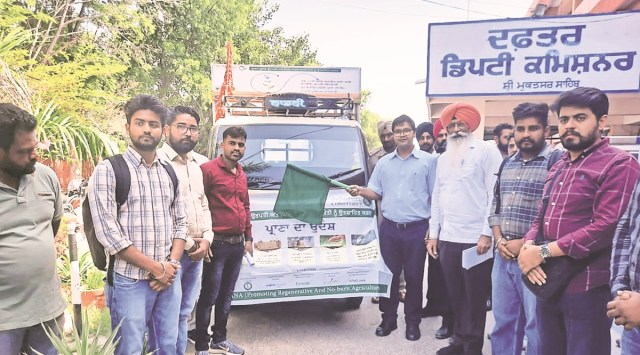Managing stubble the eco-friendly way: Global body drives its no-burn agri message home to farmers
More than 44 progressive farmers are also engaged with the mobile van campaign as they are an integral part of the peer-to-peer learning component of the campaign which seeks to encourage behaviour change among farmers in target villages.
 One of the PRANA mobile vans being flagged off. (Express Photo)
One of the PRANA mobile vans being flagged off. (Express Photo)“Education is the most powerful weapon which you can use to change the world”; taking a cue from Nobel Peace Laureate Nelson Mandela’s quote, an international organisation has taken the task of educating and making behavioural changes among farmers towards the management of crop residue.
‘The Nature Conservancy (TNC)’ has launched an awareness campaign on the promotion of regenerative and no-burn agriculture in 1,704 villages of 12 districts of Punjab for 30 days. The campaign, a part of TNC India’s Project PRANA (Promoting Regenerative and No Burn Agriculture), has been rolled out via 44 mobile vans in the target districts. District collectors of Mansa, Bathinda, Muktsar, Ferozepur, Barnala, Tarn Taran, Gurdaspur, Patiala and Moga flagged off the ‘PRANA Vans’ in their respective areas.
More than 44 progressive farmers are also engaged with the mobile van campaign as they are an integral part of the peer-to-peer learning component of the campaign which seeks to encourage behaviour change among farmers in target villages. These progressive farmers would be instrumental in resolving the queries and concerns of other farmers willing to make the shift to no-burn agriculture.
Lakhbir Singh, a farmer from Gagewal village in Barnala district, said: “A PRANA van had come to our village as they had organised a camp of farmers where they educate us about the ill effects of the burning and how to use the machines…I used to burn stubble on my eight acres of land earlier but this time I have decided to not burn stubble on five acres. To manage stubble is not an easy task for small farmers like us but I and my fellow farmers will help each other to stop burning stubble.”
In Gagewal, about 700 acres of land is under paddy and almost all of it is set on fire after harvesting.
“One progressive farmer who does not burn stubble came with a PRANA van and he shared his experiences and how stubble can be managed with a different method if one type of machine is not available,” Lakhbir said.
Farmer Jagroop Singh of Athwal village in Amritsar has not been burning stubble on his 15-acre land for the past three years.
The PRANA vans also distribute pamphlets and booklets to augment farmers’ knowledge on practices related to in-situ management of crop residue, CRM Machines like the happy seeder and super seeder, and information on sowing, irrigation, and use of fertilisers in prominent Rabi crops, such as wheat, mustard, sugarcane, oats, potato, among others.
“I will travel with a PRANA van to share my experience of not burning stubble,” he said, adding that they go from village to village and teach about in-situ and ex-situ methods treatments methods to farmers and appeal to them to start with a small piece of their land before expanding with every harvest.
Speaking about the mobile van campaign, Dr Annapurna Vancheswaran, Managing Director, TNC India said that the PRANA vans aim to be a multi-faceted outreach instrument, which will employ a combination of different techniques to engage with the farmers. “The PRANA vans have been equipped with a song and slogans which have been developed by our team, which appeal to the farmers about the need to shift towards no-burn agriculture. The vans also carry informative banners which highlight the loss of nutrients thereby highlighting deteriorating soil health when we burn crop residue, and also talk about the importance of increasing organic carbon content in the soil.”
Farmer Harpreet Singh of Daburji village of Tarn Taran district who has sown rice on 17 acres of his land, said that experts educated him about how to properly use the happy and super seeders as well as how it can be used if the crops are not harvested with the Super SMS combine harvester.







